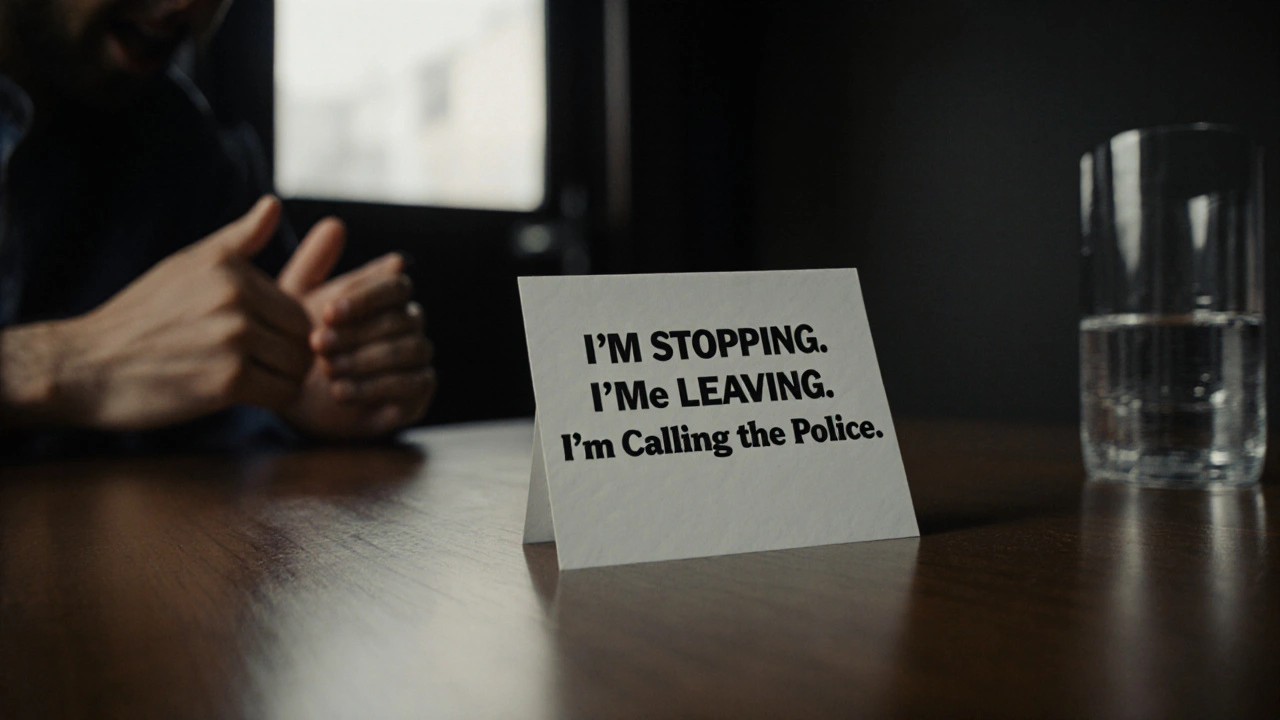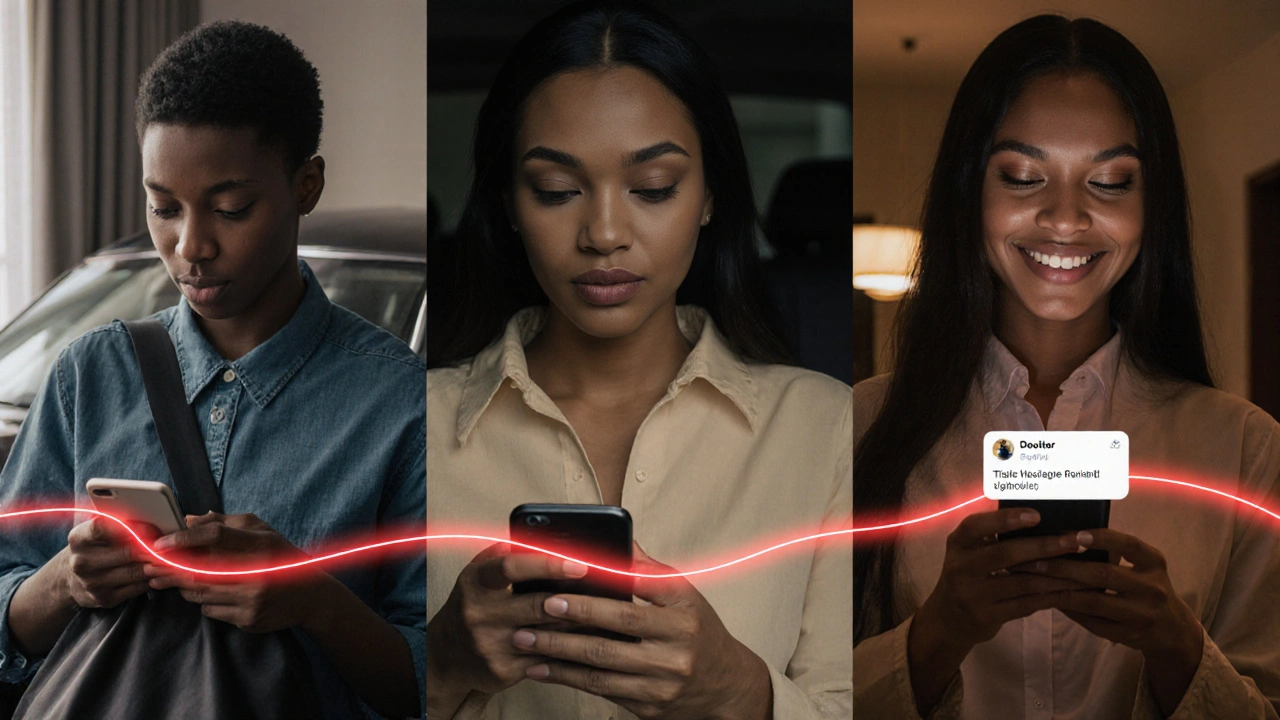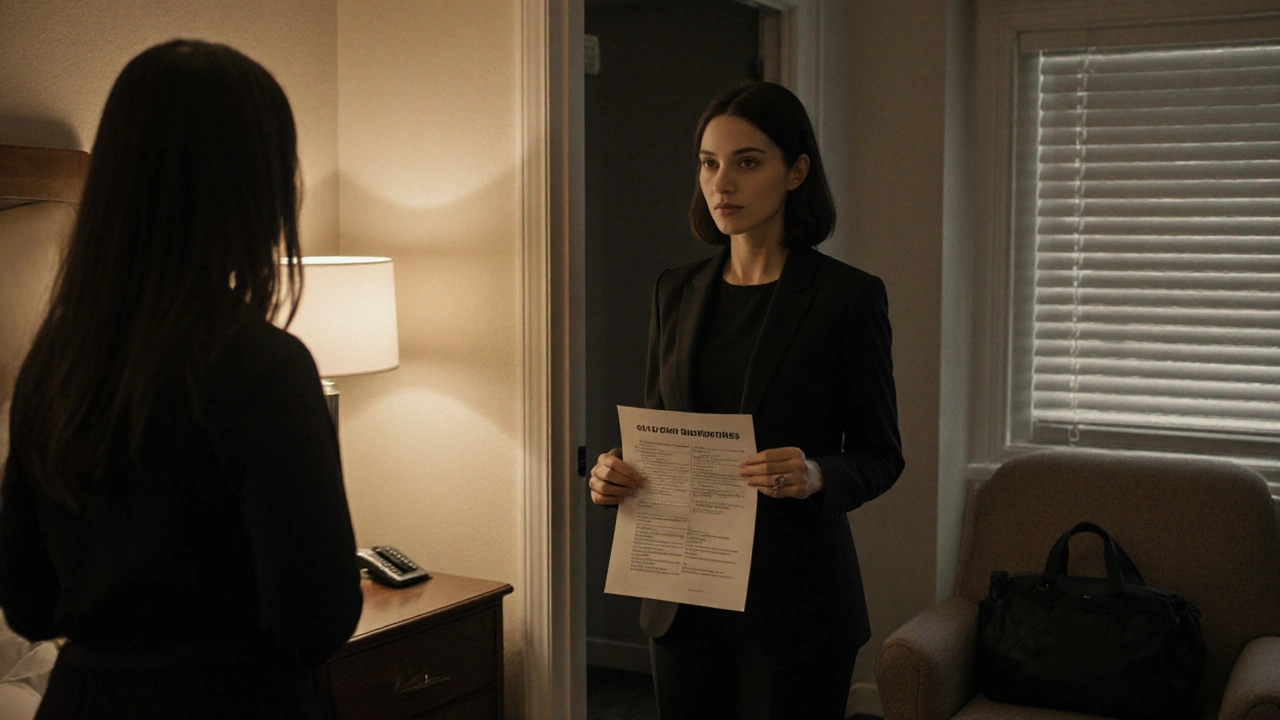Every sex worker knows the moment a client walks in can change everything. It’s not about fear-it’s about control. The difference between a safe interaction and a dangerous one often comes down to one thing: how clearly you’ve communicated your boundaries before the door even closes. This isn’t about being rigid. It’s about survival. And it’s not something you learn from a pamphlet. It’s built through practice, observation, and hard-won experience.
Start with the script, not the fantasy
You don’t need to be a performer to set boundaries-you need to be clear. The most effective safety strategy starts before the client even arrives. Write down your non-negotiables. Not in your head. Not on a napkin. In a document you can read aloud without hesitation. Include things like: "No unprotected sex," "No coming inside," "No anal without a condom," "I don’t do group sessions," "I need to see your ID," "I reserve the right to stop at any time."These aren’t requests. They’re conditions. Say them like you’re reading a weather report: calm, factual, unapologetic. If you sound unsure, people test you. If you sound like you mean it, they respect it-even if they don’t like it.
One worker in Melbourne told me she starts every session by saying, "I’m on a strict schedule. I have to be out by 9:30. If we’re not done by then, we’re done." It sounds simple. But it gives her power. It tells the client: you don’t control the clock. I do.
Screening isn’t optional-it’s oxygen
You wouldn’t let a stranger into your home without checking their name. Why let them into your body? Client screening isn’t about being paranoid. It’s about reducing risk. Use tools that actually work: reverse image search on profile pics, check reviews on trusted platforms, ask for a video call before meeting. Look for consistency. Does their story hold up? Do they know your rates? Do they ask about your boundaries before asking for discounts?Here’s what doesn’t work: trusting someone because they "seemed nice." Nice doesn’t mean safe. A man who pays on time and smiles too much can still be dangerous. A man who’s quiet and avoids eye contact might be the safest one you’ve met all week. Judge by behavior, not vibes.
One worker in Sydney started using a simple three-question script during video calls: "What’s your full name?" "Have you worked with other workers before?" "What’s your plan after this?" The answers told her more than any profile ever could. People who lie get flustered. People who are honest answer fast and straight.
Body language speaks louder than words
You can say "no" a hundred times, but if your body is tense, your voice shakes, or you look away, the message gets lost. The strongest boundary is the one you live, not just the one you speak.Practice standing tall. Keep your hands visible. Don’t let clients touch you until you’ve confirmed consent-verbally and physically. If they reach for your neck, pull back. If they try to kiss you without asking, say, "Not unless you ask first." Then wait. Let the silence hang. Most people will back off. The ones who don’t? You already know they’re not worth your time.
Learn to use your environment as a tool. Keep your bag where you can reach it. Keep your phone charged and on silent mode, but within reach. Never sit with your back to the door. Never let a client lock it. If you feel your heart racing, don’t ignore it. That’s your body telling you something’s off. Walk out. Even if they’ve paid. Even if you feel guilty. You owe them nothing but a refund.

Use the word "no" like a shield
"No" is not rude. It’s a legal right. It’s a survival tool. Too many workers are taught to soften it: "I’m not really into that," or "Maybe later." That’s not no. That’s an invitation to negotiate. And clients will. Every time.Replace those phrases with: "No." "That’s not something I do." "I’m not comfortable." Then stop talking. Don’t explain. Don’t apologize. Don’t offer alternatives. Just say it. And if they push? Say it again. Louder. Clearer.
One worker in Perth kept a laminated card in her purse with three phrases printed in bold: "I’m stopping." "I’m leaving." "I’m calling the police." She didn’t need to say more. She just slid it across the table. Most clients backed out. The ones who didn’t? She called the police anyway. No one ever came back.
Build your safety network
You don’t have to do this alone. The most dangerous thing a sex worker can believe is that they have to handle everything by themselves. Build a network. Even if it’s just one person.Have a check-in system. Text a friend when you arrive. Text again when you leave. Use a timer app that sends an alert if you don’t respond. If you’re working from home, tell someone what time you expect to be done. If you’re working in a hotel, leave your room key with the front desk and ask them to check on you if you don’t come down by a certain hour.
Join a peer group. Online or in person. Talk to other workers. Share what worked. Share what didn’t. There’s power in collective knowledge. You don’t need to be part of an organization. You just need to know you’re not the only one who’s ever said no-and lived to tell about it.
What to do when boundaries are crossed
Even the best strategies don’t always work. Sometimes, a client ignores everything. Sometimes, they get violent. When that happens, your priority is not to convince them. It’s to get out.Call emergency services. Don’t wait. Don’t worry about "making a scene." Your safety is not negotiable. If you’re scared to call police, call a trusted friend and ask them to call for you. Record the interaction if you can. Save the messages. Save the payment receipts. These aren’t just evidence-they’re your voice.
Afterward, don’t blame yourself. You didn’t fail. The client broke the rules. You set them. That’s your strength, not your weakness.

Consent is ongoing, not a one-time signature
Consent isn’t something you get at the start and forget. It’s checked every five minutes. "Are you still okay?" "Do you want to keep going?" "Is this still good?" These aren’t awkward questions. They’re the foundation of safety.Some clients will think you’re being too much. They’ll say, "You’re acting like a therapist." Good. You’re not here to be their friend. You’re here to protect yourself. If they can’t handle that, they’re not your client.
There’s no such thing as a "good client" who ignores boundaries. There’s only someone who hasn’t been tested yet.
Practice makes permanent
You don’t become good at setting boundaries by reading about them. You become good by doing them-again and again. Role-play with a friend. Practice saying "no" in the mirror. Record yourself. Listen to how you sound. Change it until it feels strong.Boundaries aren’t built in a day. They’re built in moments. Every time you say no. Every time you walk away. Every time you trust your gut. Those moments stack up. And one day, you realize: you don’t have to fear the next client. Because you know exactly what you’ll do when they cross the line.
That’s not luck. That’s power.
How do I know if a client is trying to test my boundaries?
Clients who test boundaries often start with small requests: "Can we skip the condom?" "Can we go a little longer?" "Can we just kiss?" They might seem polite, even charming. But if they push after you say no, or try to guilt you into changing your mind, that’s a red flag. Trust your gut. If you feel uneasy after a question, it’s not your imagination-it’s your body warning you.
What if I’m working alone and feel unsafe?
If you’re alone and feel unsafe, leave immediately. Don’t wait for it to get worse. Use your phone to call a friend or emergency service. If you can’t speak, send a pre-set text like "Check on me at 9:30" or use a safety app that shares your location. Keep your bag and keys within reach at all times. Your safety is more important than any payment.
Is it okay to charge more for clients who want extra services?
Yes. If a client asks for something outside your boundaries, you can offer alternatives-within your comfort zone. For example: "I don’t do unprotected sex, but I can do a massage for an extra $50." This keeps the conversation open while protecting your limits. Never feel pressured to lower your rates for risky requests. Your safety is worth more than any dollar amount.
Should I share my real name with clients?
You don’t owe anyone your real name. Use a stage name. Keep your personal details private. If a client insists on knowing your full name, address, or social media, that’s a warning sign. Legitimate clients respect your privacy. Those who don’t are looking for control, not service.
What’s the best way to screen clients without seeming rude?
You don’t need to be rude to be safe. Use a standard screening script: "I need to see your ID before we meet," "Can we do a quick video call first?" "Do you have experience working with sex workers?" These questions are normal in the industry. Most respectful clients expect them. If someone gets offended, they’re not the right fit.
Next steps: Start today
You don’t need to overhaul your whole routine. Start with one thing. Write down your three non-negotiables. Practice saying them out loud. Set up a check-in system with a friend. Delete one client who’s made you uncomfortable. Small steps build real safety.Every time you say no, you’re not just protecting yourself-you’re reinforcing a rule that says: my body, my rules. And that’s the most powerful thing you can carry into every room.
